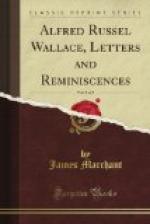My dear Mr. Poulton,—Many thanks for sending me Weismann’s additional Essays,[20] which I look forward to reading with much pleasure. I have, however, read the first, and am much disappointed with it. It seems to me the weakest and most inconclusive thing he has yet written. At p. 17 he states his theory as to degeneration of eyes, and again, on p. 18, of anthers and filaments; but in both cases he fails to prove it, and apparently does not see that his panmixia, or “cessation of selection,” cannot possibly produce continuous degeneration culminating in the total or almost total disappearance of an organ. Romanes and others have pointed out this weakness in his theory, but he does not notice it, and goes on calmly throughout the essay to assume that mere panmixia must cause progressive degeneration to an unlimited extent; whereas all it can do is to effect a reduction to the average of the total population on which selection has been previously worked. He says “individuals with weak eyes would not be eliminated,” but omits to notice that individuals with strong eyes would also “not be eliminated,” and as there is no reason alleged why variations in all directions should not occur as before, the free intercrossing would tend to keep up a mean condition only a little below that which was kept up by selection. It is clear that some form of selection must always co-operate in degeneration, such as economy of growth, which he hardly notices except as a possible but not a necessary factor, or actual injuriousness. It appears to me that what is wanted is to take a number of typical cases, and in each of them show how Natural Selection comes in to carry on the degeneration begun by panmixia. Weismann’s treatment of the subject is merely begging the question.—Yours faithfully,
A.R. WALLACE.
* * * * *
TO PROF. POULTON
Parkstone, Dorset. August 29, 1892.
My dear Mr. Poulton,—As to panmixia you have quite misunderstood my position. By the “mean condition,” I do not mean the “mean” during the whole course of development of the organ, as you seem to take it. That would indeed be absurd. I do mean the “mean” of the whole series of individual variations now occurring, during a period sufficient to contain all or almost all the variations to which the species is now subject. Take, for instance, such a case as the wings of the swallow, on the full development of which the life of the bird depends. Many individuals no doubt perish for lack of wing-power, due to deficiency in size or form of wing, or in the muscles which move it. The extreme limits of variation would be seen probably if we examined every swallow that had reached maturity during the last century. The average of all those would perhaps be 5 or 10 per cent. below the average of those that survive to become




